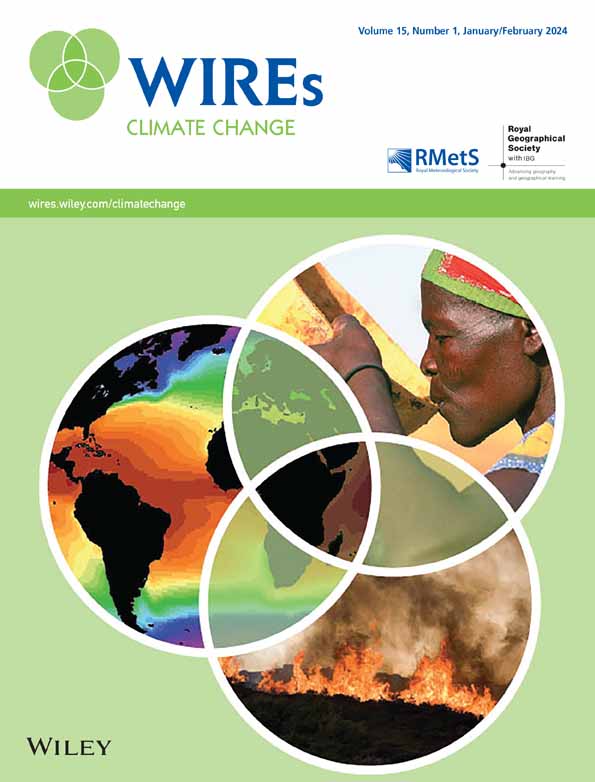A critical review of disproportionality in loss and damage from climate change
IF 10.3
1区 环境科学与生态学
Q1 ENVIRONMENTAL STUDIES
引用次数: 9
Abstract
The notion of disproportionate impacts of climate change on certain groups and regions has long been a part of policy debates and scientific inquiry, and was instrumental to the emergence of the “Loss and Damage” (L&D) policy agenda in international negotiations on climate change. Yet, ‘disproportionality’ remains relatively undefined and implicit in science on loss and damage from climate change. A coherent theoretical basis of disproportionality is needed for advancing science and policy on loss and damage. It is necessary to ask: What is disproportionate, to whom, and in relation to what? We critically examine the uses of disproportionality in loss and damage scholarship by analyzing how disproportionality is treated in the literature conceptually, methodologically, and empirically. We review publications against a set of criteria derived from seminal work on disproportionality in other fields, mainly environmental justice and disaster studies that have analyzed environment–society interactions. We find disproportionality to be dynamic and multidimensional, spanning the themes of risks, impacts, and burdens. Our results show that while the concept is often used in loss and damage scholarship, its use relies on unarticulated notions of justice and often lacks conceptual, methodological and empirical grounding. Disproportionality also appears as a boundary concept, enabling critical and multiscalar explorations of historical processes that shape the uneven impacts of climate change, alongside social justice and normative claims for desired futures. This emerging area of science offers an opportunity to critically re‐evaluate the conceptualization of the relationship between climate‐change‐related impacts, development, and inequality.对气候变化造成的损失和损害的不相称性的批判性审查
长期以来,气候变化对某些群体和地区的不成比例影响的概念一直是政策辩论和科学探究的一部分,并有助于在国际气候变化谈判中出现“损失与损害”(L&D)政策议程。然而,在气候变化造成的损失和损害的科学中,“不成比例”仍然相对不明确和隐含。为了推进有关损失和损害的科学和政策,需要一个连贯的不成比例理论基础。有必要问:什么是不成比例的,对谁不成比例,与什么不成比例?我们通过分析在概念上、方法上和经验上如何处理文献中的歧化,批判性地检查歧化在损失和损害奖学金中的使用。我们根据一套标准来审查出版物,这些标准来自于其他领域的不成比例的开创性工作,主要是环境正义和分析环境-社会相互作用的灾害研究。我们发现,失衡是动态的、多维的,涉及风险、影响和负担等主题。我们的研究结果表明,虽然这一概念经常用于损失和损害研究,但它的使用依赖于未明确的正义概念,并且往往缺乏概念、方法和经验基础。歧化也作为一个边界概念出现,使得对塑造气候变化不平衡影响的历史过程进行关键和多标量探索,以及对理想未来的社会正义和规范要求。这一新兴科学领域为批判性地重新评估气候变化相关影响、发展和不平等之间关系的概念化提供了机会。
本文章由计算机程序翻译,如有差异,请以英文原文为准。
求助全文
约1分钟内获得全文
求助全文
来源期刊

Wiley Interdisciplinary Reviews: Climate Change
METEOROLOGY & ATMOSPHERIC SCIENCES-
CiteScore
20.00
自引率
2.20%
发文量
58
审稿时长
>12 weeks
期刊介绍:
WIREs Climate Change serves as a distinctive platform for delving into current and emerging knowledge across various disciplines contributing to the understanding of climate change. This includes environmental history, humanities, physical and life sciences, social sciences, engineering, and economics. Developed in association with the Royal Meteorological Society and the Royal Geographical Society (with IBG) in the UK, this publication acts as an encyclopedic reference for climate change scholarship and research, offering a forum to explore diverse perspectives on how climate change is comprehended, analyzed, and contested globally.
 求助内容:
求助内容: 应助结果提醒方式:
应助结果提醒方式:


